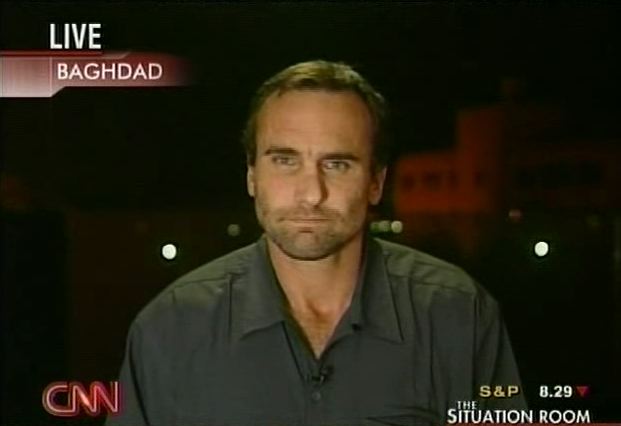TSR: "They can't just visit, sit down, and have a cup of tea..."

Click photo to play
Length: 3:40
BLITZER: In the interview, president said he speaks with the U.S. ambassador there. He speaks with the Iraqi leadership. He speaks with the U.S. military commander, General George Casey. And they are telling him that this is not a civil war. That steps are moving in the right direction. Albeit a very, very difficult process.
Let's go to Baghdad. Our correspondent Michael Ware has been spending some time outside what's called the Green Zone. He gets out there. You did an excellent piece yesterday, Michael, on the al Qaeda movement in Iraq right now even in the aftermath of the killing of the former al Qaeda leader there, Abu Musab al-Zarqawi.
Is this or is this not a civil war?
MICHAEL WARE, CNN CORRESPONDENT: Well, it certainly feels like a civil war to the people on the street. When you go out and mix with people, something that President Bush's sources, General Casey and Ambassador Khalilzad, simply cannot do. You get the sense from people that it feels like a civil war "when my neighbor's body is showing up dead on the street or on the rear allotment, and it's happening repeatedly.
"I can't send my kids to school because they have to cross sectarian lines. The marketplace blew up three days ago for no apparent reason." These people say this feels like civil war.
And if President Bush talks about Ambassador Khalilzad and General Casey as his sources of information, these people -- everyone within the U.S. forces here -- live in a bubble. They couldn't be further distant from the Iraqi reality than humanly imaginable, Wolf?
BLITZER: But there are, what 140,000 plus U.S. troops in Iraq. Presumably they go out there just as you do. They try to meet with Iraqi people. And they report back to their commanders on what they see and hear.
WARE: Yes, there's a number of things here. For a start, we live in what the military calls the Red Zone. We live with Iraqis. We have Iraqis all around us. So it's very easy for us to get the mood of the people. We live with it. As petrol prices go up or go down or whether electricity was on last night or not.
The only time the military visits someone's house is for a military purpose. And it's always heavily armed and ready to go. They can't just visit, sit down and have a cup of tea and an honest chat.
The other is what commanders are sending from the field doesn't necessarily reach the top. And if it does, there's so many disconnects in between and so many filters that I time and time again come across commanders and intelligence officers expressing such frustration at what they see is the distortional reinterpretation of their work before it reaches people like the president. Their commander in chief, Wolf.
BLITZER: You spent some time with al Qaeda operatives inside Iraq in recent days. How do you do that, Michael? How do you get out there and you meet these guys. You got to be scared out of your mind.
WARE: Well, Wolf, I've been here since before the invasion, entering three-and-a-half years. I'm now awaiting my fourth Ramadan, or holy month offensive. So I've been here a long time.
I met many of these people when they were still reeling from the aftermath of the invasion. This is Saddam's top generals, his brigadiers, his colonels, his top intelligence elite. And so I've known them since they became disillusioned to the insurgency. So this is not easily done. And it's come over a long time, Wolf.
BLITZER: Michael Ware is a brilliant, brilliant reporter. An extremely courageous guy. And a nice guy as well. Good luck over there and be careful, Michael.
Thank you very much.
